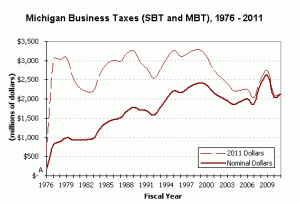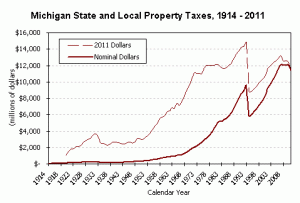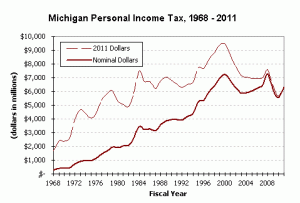Broad tax cuts won't propel Michigan to prosperity, says economist
George Erickcek, a senior regional economist at the Upjohn Institute for Employment Research in Kalamazoo, says Michigan might encourage more new investment by offering targeted tax credits on new manufacturing equipment rather than eliminating the personal property tax.
Erickcek also says Michigan’s new 6 percent Corporate Income Tax might leave the state strapped for tax revenues in the next economic downturn.
In a wide-ranging interview with Bridge, Erickcek says Michigan needs a tax structure that will provide enough revenues to support a top-notch educational system and other services required for the state to prosper in a knowledge economy.
Bridge: By the end of the year, the personal property tax repeal should be law. Coupled with the repeal of the Michigan Business Tax and adoption of the limited Corporate Income Tax, is this the single largest change in a state’s treatment of business taxation in recent years.
A: It is. The change from the MBT to the corporate income tax is very large. Elimination of the personal property tax is a big change as well. However, we have to remember that new industrial personal property since 1974 was abatable (under Public Act 198) and especially in distressed urban areas (under Public Act 328.)
So we are moving from a policy that provided an incentive system for business seeking to expand into the state to a state tax cut for all manufacturers with personal property in the state. Many of the state's manufacturers may not be interested in expanding their operations and therefore, the overall PPT repeal could be less effective, dollar for dollar in encouraging economic development than the present system.
The governor is not proposing to do away with the entire personal property tax, only the PPT on industrial property and for small commercial firms -- with personal property valued at less than $40,000. The tax on utilities and large commercial property would remain. In some respect that makes sense. The state's utilities and large commercial businesses do not compete, in general, for markets outside the state; therefore the PPT does not impact their competitiveness.
Bridge: If companies can get taxes abated on new equipment through existing law, why eliminate the personal property tax altogether?
A: One argument is that it will do away with a lot of paperwork. I think the governor is correct in that he wants to make taxes as simple as possible. However, as I said before, by eliminating the PPT, you are providing tax cuts for businesses that may not be interested in expanding in the state. By targeting tax incentives to businesses that are seeking to expand in the state, the state should get a bigger bang for its tax policy.
It is not wise tax policy to tax new industrial investment in the state; however, at the same time, local governments should be compensated and old investments could be taxed to encourage reinvestment.
Bridge: Gov. Rick Snyder’s business tax philosophy is to eliminate most targeted tax incentives in favor of lowering tax rates across the board. Is this the most effective way to generate new investment?
A: Changing average tax rates is not the most effective tool for influencing business location decisions. Tax incentives on the margin may influence those decisions, though.
The state of Michigan and George Erickcek have a hard time picking winners. However, we can have policies that say to business, ‘If you are ready to expand, we’ll help you.’
The work Tim Bartik (an Upjohn Institute senior economist) and I have done on the MEGA incentives program (eliminated by Snyder and the Legislature) showed that the cost of the program was $4,000 per job. We would argue that each job is worth more than $4,000.
Bridge: Explain the difference between taxes that tend to be cyclical in revenue amounts and taxes that tend to be more stable.
A: If you take a look at the change from the old MBT to the 6 percent Corporate Income Tax, the MBT taxed corporate income and sales revenues. Now it’s totally based on profits. A profits tax is one of the most cyclical forms of taxes available. It goes up and down with the business cycle. We’ve put a vulnerable tax system in place.
The Corporate Income Tax looks like a very smart move in 2012. It should bring in surprisingly strong revenue. However, in the next downturn, I think the state will be sadly surprised to see how Corporate Income Tax revenues have disappeared.
Back in the days of the Single Business Tax, which was designed by a bunch of economists and loved only by economists, we had a very stable tax. Businesses hated it because they had to pay it if their income was down. But the Treasury could depend on the SBT for a consistent revenue flow.
My only advice to the state now is to get a rainy day fund going, because the state will need it when the bad times come.
Bridge: We often look to Indiana and other states with a reputation for low taxes as economic models for Michigan. Is that the right approach?
A: Michigan cannot compete on price alone. That’s true of business and government. We don’t need the cheapest government. One of our greatest strengths is our education system. If we undercut education and don’t provide businesses with the advanced skills they need in their work forces, we’re going to have a problem.
We don’t want to be the highest-tax state in the union, although many high-tax states are doing well. We don’t want to starve education; we don’t want bad roads. We need to provide the kind of government an advanced economy expects.
Bridge: Is the rising number of municipal budget crises more a result of imprudent fiscal decisions -- pension multiplier boosts, for just one example -- or a result of restricted revenue streams, such as Proposal A and the proposed personal property tax repeal?
A: Most of the problem is a lack of ability for core cities to expand and annex property. As a city gets older, more people move out and the city generates less property taxes and revenues.
Michigan’s home rule law makes it very difficult for cities to expand. We put a very high value on townships to do their own zoning, establish their tax policy and provide services. People who move to townships tend not to need a high level of services.
Bridge: How much weight do you assign to tax cuts in businesses' location and expansion decisions?
A: I think it’s pretty modest. When a business wants to expand, it is looking at such things as the quality of work force, market location and access to freeways. That seems to have a lot more influence than tax structure. And when businesses are ready to make their decisions, (tax) incentives appear to be more important than tax structure.
Bridge: The Citizens Research Council of Michigan has said that any positive economic bounce from the business tax cuts could be offset by the tax increases in individuals. Do you agree?
A: With a growing economy, the personal income is fairly stable. It does go down, but not as much as the Corporate Income Tax.
I think the Earned Income Tax Credit (which has been reduced) was good tax policy. It had the right incentives in terms of promoting work. I think everyone who is able to work should work.
The real challenge was in the pension tax. The state had a very generous tax policy toward seniors. It was coming to the point that the state could no longer support the generosity in how pensions were taxed. I think it was good to try to recapture some of the tax forgiveness in pensions.
CRC 2012 Tax Outline for Michigan
Bridge: If you were king of Michigan, what kind of tax policy would you implement?
A: One thing we haven’t talked about is a progressive income tax. That is off the board because it would require a change in state constitution. In my book, the first thing I would do is look at progressive income tax.
Bridge: Why?
A: I think what we are noticing in the country and state is a growing income inequality. A progressive income tax would address that. To someone who is well off, a dollar doesn’t mean as much to those with low incomes.
I also would return to a less cyclical business tax, one based more on sales or something that would be less cyclical than a profits tax. And I would focus more on offering economic incentives on new investment.
Finally, I would do something about improving the ability of cities to expand their tax base.
Bridge: What other steps would you take to improve the economic lives of Michigan citizens?
A: That one has to be education. The data show very convincingly that a solid pre-kindergarten education and kindergarten through third grade are very important. I would give those areas preferential funding.
The question is, how we develop a revenue stream to support education?
What I find more troubling is that everywhere you go, you’ll find public leaders talking about the importance of public education. But at the same time, those leaders are depriving educational leaders the money they need to do their jobs.
I don’t want to step into the political debate at all. But what will separate Michigan from the pack is the quality of the work force and education. That’s where we have to compete.
For those who say that some of the money is wasted on teacher salaries, pensions and administration, there are going to be errors on both sides of the equation. It is better to err on that side than turn our education system into something that is mediocre. We can’t afford that.
Bridge: What about the skyrocketing cost of a college education?
A: Does tuition have to be as high as it is? Does it have to increase every year as high as it does? Those are the gray areas.
But it is becoming somewhat shocking how little our state is supporting our universities and how much the burden has been shifted to students and families. It’s gone too much in that direction.
Rick Haglund has had a distinguished career covering Michigan business, economics and government at newspapers throughout the state. Most recently, at Booth Newspapers he wrote a statewide business column and was one of only three such columnists in Michigan. He also covered the auto industry and Michigan’s economy extensively.
Business Watch
Covering the intersection of business and policy, and informing Michigan employers and workers on the long road back from coronavirus.
- About Business Watch
- Subscribe
- Share tips and questions with Bridge Business Editor Paula Gardner
Thanks to our Business Watch sponsors.
Support Bridge's nonprofit civic journalism. Donate today.
See what new members are saying about why they donated to Bridge Michigan:
- “In order for this information to be accurate and unbiased it must be underwritten by its readers, not by special interests.” - Larry S.
- “Not many other media sources report on the topics Bridge does.” - Susan B.
- “Your journalism is outstanding and rare these days.” - Mark S.
If you want to ensure the future of nonpartisan, nonprofit Michigan journalism, please become a member today. You, too, will be asked why you donated and maybe we'll feature your quote next time!





